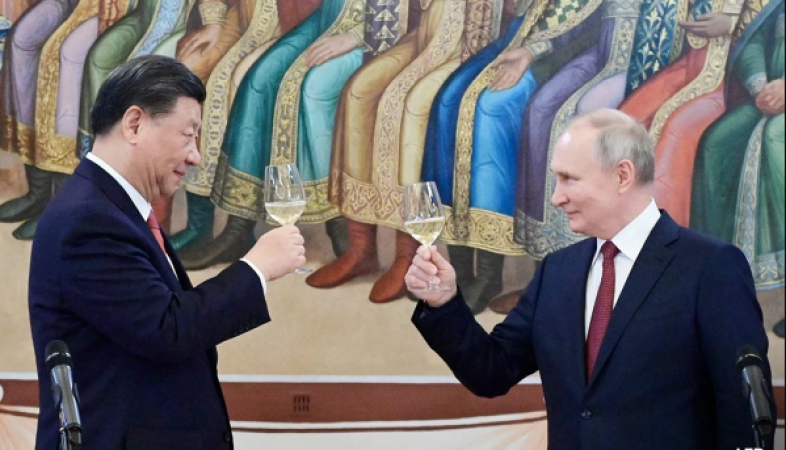
Moscow: Following talks with Chinese President Xi Jinping on Tuesday, Russian President Vladimir Putin stated that Chinese proposals could serve as the foundation for a peace agreement in Ukraine, but that Kyiv and the West were not yet prepared.
The two men warned against taking any actions that could turn the Ukraine conflict into a "uncontrollable phase" in a joint statement at the conclusion of Xi's state visit to Moscow, and they pointedly added that there could be no winners in a nuclear war.
Putin charged that the West was fighting "to the last Ukrainian," and Xi reaffirmed China's "neutral position" on the country and encouraged communication.
Also Read: Chinese opposition to US military presence is voiced by Philippine President Marcos Jr.
Numerous elements of the Chinese peace plan, in our opinion, are in line with Russian positions and can serve as the foundation for a peaceful resolution when the time comes in the West and in Kyiv. But as of now, we have not observed any such readiness on their part," said Putin.
China's 12-point paper proposal, which calls for a de-escalation and eventual cease-fire in Ukraine, is vague about how to put an end to the fighting. Given Beijing's refusal to condemn Russia over the Ukraine, the United States has dismissed the Chinese proposal and claims that a cease-fire now would lock in Russian territorial gains and give Putin's army more time to regroup.
Although Ukraine says Russia must withdraw its troops and stresses the significance of Ukraine's territorial integrity, it has welcomed China's diplomatic involvement.
The "no limits" partnership that the two leaders announced in February of last year, less than three weeks before Russia invaded Ukraine, was meant to be strengthened during the Kremlin talks.
Also Read: 3 members of Daesh are killed in an Afghan Taliban raid in Kabul
After what Putin referred to as "successful and constructive" negotiations, they signed a number of documents on a "strategic cooperation," which made it clear that China was now Russia's top trading partner.
In televised remarks, Putin stated, "I am confident that our multifaceted cooperation will continue to develop for the benefit of the peoples of our countries.
Putin is facing off against what he perceives as a hostile West determined to hand Russia a "strategic defeat," so Xi's state visit is a huge boost for him.
Days after a global court issued an arrest warrant for Putin in relation to Russia's actions in Ukraine, where Russian forces have made little headway in recent months despite suffering significant losses, the Chinese leader paid a visit to Moscow.
Xi and Putin urged the US to stop "undermining global strategic security" and stop working on a global missile defence system in their joint statement.
But even as they promised to conduct more frequent joint military exercises, the two leaders emphasised that their countries' closer ties were not intended to form a "military-political alliance" or be used against any other country.
The coveted pipeline that will transport Russian gas to China has been completed, according to Putin, who also declared that Moscow is prepared to increase oil exports to Beijing.
The parties involved in the pipeline, which Putin referred to just before Xi's visit as "the deal of the century," were only stated to be making efforts to advance the study and approval of the pipeline in a joint statement following the talks. The pipeline is not mentioned in the English versions of Xi's two statements that were released following the meetings.
Alexander Novak, the deputy prime minister of Russia, told reporters that some details still needed to be worked out. According to Novak, "instructions were given to companies to work out the details of the project in detail and to sign it as soon as possible.
"Orders have been issued to ensure the terms of the agreement. We anticipate it happening this year. 50 billion cubic metres (bcm) of natural gas would be transported annually from Russia to China via the Power of Siberia 2 pipeline. The idea was originally proposed by Moscow many years ago, but it is now more urgent as Russia looks to China to displace Europe as its main petrol customer.
Also Read: Cruise missiles are fired by North Korea off its eastern coast
China already receives gas from Russia's Gazprom through the Power of Siberia pipeline as part of a $400 billion, 30-year agreement that was started at the end of 2019. The pipeline is about 3,000 km long (1,865 miles).
The record 177 bcm of petrol that Russia exported to Europe in 2018–19 is still only a small portion of what it is currently exporting to China. Putin declared on Tuesday that by 2030, Russia would send at least 98 bcm of petrol to China.